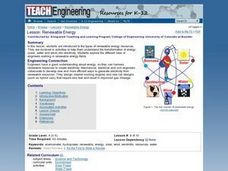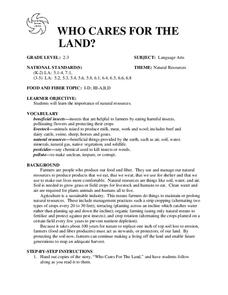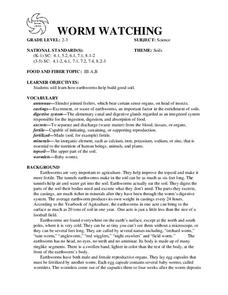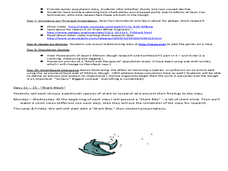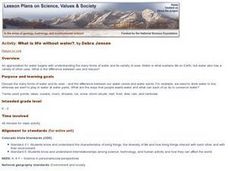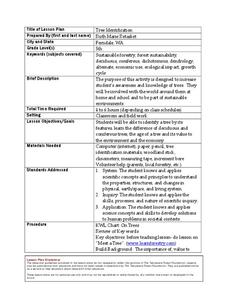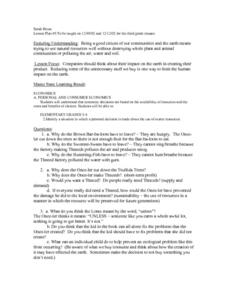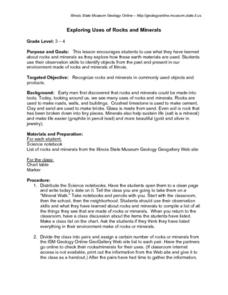Curated OER
America's Energy Future
Students write a proposal to save energy resources. In this energy lesson plan, students research nuclear energy, coal power, petroleum, natural gas, hydroelectric power, and renewable energy. Students then debate energy issues and share...
Curated OER
Weather Anomalies
Ninth graders participate in a simulation of a select scientific team from the National Oceanic and Atmospheric Administration (NOAA).
Curated OER
Designing Future Houses
Students discuss the changes we face and what kind of future house designs students can imagine. They create a floor plan, make an architectural drawing, and write a short description about their future house.
Curated OER
TE Lesson: Renewable Energy
Students examine renewable energy sources such as solar, water, and wind. They experiment to determine how renewable energy is transformed into electricity. They investigate the role of engineers who work in the field of renewable energy.
Curated OER
WHO CARES FOR THE LAND?
Students explore the importance of natural resources. They are given copies of the story, "Who Cares For The Land," and students follow
along as the teacher reads it. Students identify the key points in the story. (Soil, water and air...
Curated OER
WORM WATCHING
Young scholars investigate how earthworms help build good soil. They examine the worms carefully to find the ringlike segments and swollen band at the front of the earthworm's body. Students take turns dampening the soil every day and...
Curated OER
Go Fish! Exploring The Tragedy of the Commons
Students discover what happens when people take advantage of shared resources. In this ecology lesson, students explore "The Tragedy of the Commons" by playing a role playing simulation game in small groups. Students soon discover the...
Curated OER
Vermicomposting
First graders investigate composting. In this biology lesson, 1st graders identify ways to use garbage as fertilizer. Students examine soil and compost matter as well as the role of worms in the dirt.
Curated OER
Making a Food Web and Learning About Ecosystems
Third graders examine the difference between a food web and food chain. They also examine the importance of the sun in a food web and food chain. Students understand what happens when you remove parts of the chain.
Curated OER
Introduction to the Barnegat Bay Estuary
Students research estuaries. In this estuaries lesson, students discuss the differences in a bay and an ocean. Students watch a PowerPoint of the properties of the estuaries and geography of Barnegat Bay. Students complete a worksheet...
Curated OER
Listening to the Prairie
Pupils, in groups, visit an exhibit and for a prairie scavenger hunt to locate sunflowers and name products made from them. After sketching a prairie dog, they find nature cues farmers use when growing plants and raising animals. The...
Curated OER
Flower Power
Students view examples of Robert Harris' artwork to identify and describe the ecosystems in them. In groups, they work together to discuss how ecosystems breakdown and create solutions to keep this from happening. To end the lesson,...
Curated OER
What is Life Without Water?
Students differentiate between how they use water in response to a need and how they use water for pleasure. They read books about water, participate in class discussion and illustrate their observations.
Curated OER
Ethical Consumer Choices in the Global Village
Pupils identify an issue and provide several reasons to support a position. They describe ways members of a community meet one another's needs. Students explain their roles, rights, and responsibilities within the community.
Curated OER
Tree Identification
Students list four ways to identify trees. In this tree identification instructional activity, students use tree identification techniques such as leafs, bark, wood grain, soil type, and climate to create tables and graphs.
Curated OER
Thinking about Energy
Students examine their understandings about energy concepts by completing an online survey. Students participate in a class discussion about their uses of resources and the differences between perpetual, renewable, and nonrenewable...
Curated OER
Overpopulation
Students examine population growth and how it impacts our environment. In this population lesson students identify the causes and consequences of overpopulation.
Curated OER
Economics -- Third Grade
Third graders read the Dr. Seuss book The Lorax. In groups, they answer questions that are related to economics and distribution of goods. They also identify the environmental issues present in the book and perform a skit in front of the...
Curated OER
ESL Holiday Lessons: Biodiversity Day
In this language skills activity, students read an article about World Biodiversity Day. Students respond to 6 matching questions, 29 fill in the blank questions, 30 multiple choice questions, 12 word scramble questions, 30 short...
Curated OER
Temperate Forests vs. Wetlands
Students compare and contrast the temperate forest and wetlands by researching them in groups. In this forest lesson plan, students identify the economic, ecological, and social benefits of each.
Curated OER
Landform Dictionary
Third graders use a word processing program to create a working dictionary, including definitions and pictures, of physical land forms used in the study of different regions of the world.
Curated OER
Testing Water Quality
In this science worksheet, students test the quality of water taken from a local source and test it in a lab for the ingredients present.
Curated OER
Exploring Uses of Rocks and Minerals
Young scholars explore the uses of rocks and minerals. They make observations to identify objects from the present and past are made out of rocks.
Curated OER
Traveling with Flat Stanley
students use the internet to gather geographical data about a state of their choice. Using new vocabulary, they describe the features present in the state, its climate and attractions. They develop a PowerPoint presentation to share...





